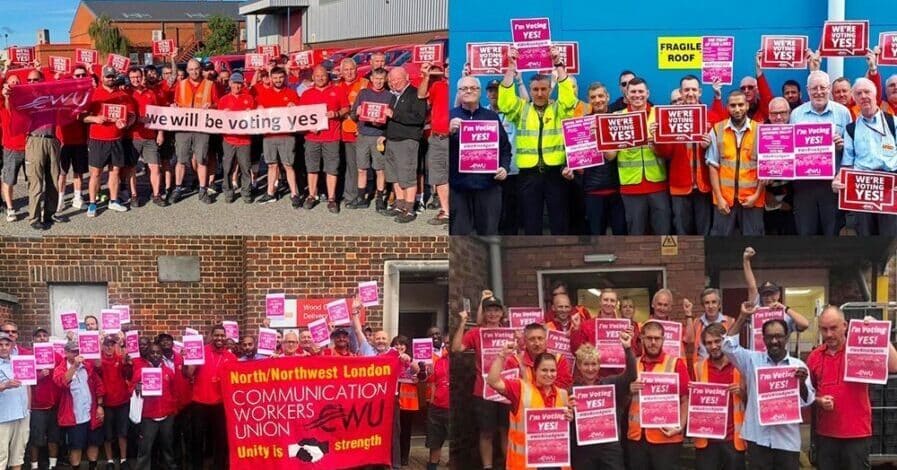

The CWU leaders have been combative in words, agitating for postal workers to stand strong, but their practical response of monitoring subgroups and possible legal challenges won’t stop Royal Mail. The Postal Executive is not deciding on action till 13 November, five days after mediation ends– why the delay? And there is no preparation for the type of injunction that stopped strikes dead in 2007 and 2017.
The legal limits that undermine strikes range from court injunctions by elite judges blocking strikes to organised scabbing, protected by the police. Most damagingly, the Tory anti-union laws block unions’ abilities to support unofficial action, organise secondary picketing to spread the action, or strike for political objectives. CWU leaders spoke militantly but took no action against privatisation in 2013, talking out a potential strike while the Tories openly prepared the sell-off.
These are the legal limits which CWU leaders (or any union leaders) won’t cross, despite their praise for wildcats, like Bootle.
The danger is, when a dispute hits these legal barriers, our leaders cave in for fake talks, leaving the initiative in a management’s hands. This happened twice in 2007 and again 2017. The rank and file must urgently get organised to take control of the strike.
Bootle’s initial success shows how possible and necessary unofficial action is at key moments, but also its limits.
Drivers refused to cross picket lines and were immediately victimised. So hundreds of workers walked out of Warrington Mail Centre in support of their workmates. Seaforth DO also came out in support.
But that still leaves Royal Mail able to decide where to make concessions and where to be intransigent. A panicked Royal Mail reinstated the Warrington drivers in order to isolate Bootle. No one can blame Warrington for returning to work having won, but the whole area should have been called out until Bootle had won. If they escalate, we need to escalate too – but the union leaders won’t in these situations.
Without rank and file organisation workers are in the weakest position to make such decisions and carry them out, despite our shopfloor strength and great traditions of solidarity. Strike committees in workplaces and local meetings of reps and activists can co-ordinate our actions, allowing the rank and file to discuss and decide strategy at every twist and turn of the strike: when to make a stand; when to avoid a provocation; how to continue the action when Royal Mail is trying to divide and rule.
Most importantly workers urgently need to prepare now to take strike action even if there’s an injunction, or to deliver solidarity to another office so it isn’t isolated, with mass pickets to stop scabs. There are even rumours of Rico Back trying a lockout. Workers should be prepared for anything with this anti-union management – and we should demand the union backs us.
Starting locally, but linking up regionally and ultimately nationally, workers themselves, the ones whose jobs are at stake and who are taking the action, can decide where to go and control negotiations.
For instance Terry is saying we should start with an “all-in” serious action – three days all sections out, rather than rolling action – and the union is now asking reps to give their opinion. That’s right, we should start strong to use Christmas rush and show Royal Mail we are up for a fight, escalating quickly to all-out if it proves necessary.
But rather than individual consultation, reps and activists should meet to discuss it together, and then keep the meetings going to decide how to escalate. It will give massive confidence and sense of purpose to the grassroots, rather than periods sent waiting for action or secret negotiations to collapse.
The rank and file, organised in a movement, should not only control strikes and negotiations, but the union itself, through recallable leaders paid a skilled workers’ wage.
No offence to Terry, Dave Ward and the rest who have done a great job in mobilising the members, but a £100,000 wage means in the end they’re not in the same boat. We have to fight; it’s our job. If the union went bust, they would probably get a job with the TUC, not back on the shopfloor.
Their commitment to the union’s offices and structures in Wembley and Alvescott and their strategic objective of getting Royal Mail back to the table, means they won’t go all the way with mass action when we need to – even when we face “the fight of our lives” in Terry’s words.
Of course the rank and file should demand the union leaders back them; after all it would provide a big boost to any action if our leaders came out in favour of it. But we must be organised to deliver the decisive, unofficial action needed to win, and counteract the pressure brought to bear on the union by Royal Mail, the media and the state.
The General Election campaign gives us a great opportunity to show millions the difference between precarious employment by diktat management for private profit and a renationalised mail service, run under workers’ control, for the good of the people. On this basis, we can build mass pickets, solidarity committees and a Labour government.